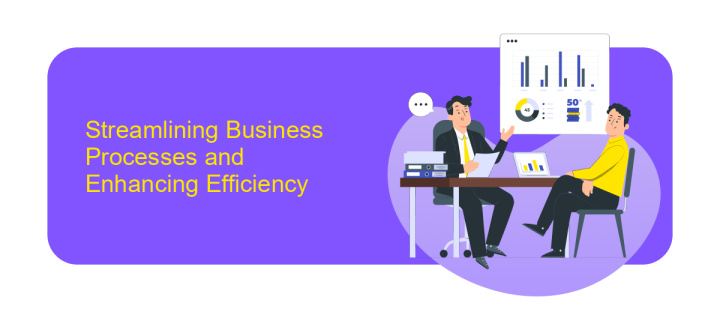Why API Integration is Important
In today's rapidly evolving digital landscape, API integration has become a cornerstone for businesses seeking efficiency and innovation. By seamlessly connecting disparate systems and applications, APIs enable streamlined operations, enhance data sharing, and foster collaboration. This integration not only reduces manual effort but also drives agility and scalability, allowing businesses to respond swiftly to market demands and deliver enhanced customer experiences.
Understanding API Integration and Its Benefits
API integration is the seamless connectivity that allows different software systems to communicate and share data with each other. It is a vital component in today's digital ecosystem, enabling businesses to enhance their operations by automating processes and improving communication between various applications. By integrating APIs, companies can streamline workflows, reduce manual errors, and ensure real-time data exchange, ultimately leading to increased efficiency and productivity.
- Improved Efficiency: Automate repetitive tasks and reduce the need for manual input.
- Enhanced Connectivity: Facilitate seamless communication between disparate systems.
- Scalability: Easily adapt to growing business needs without extensive reconfiguration.
- Cost Reduction: Minimize operational costs by optimizing resource allocation.
- Innovation: Foster innovation by enabling access to new functionalities and services.
By leveraging API integration, businesses can unlock new opportunities for growth and innovation. It allows organizations to remain competitive in a rapidly changing market by providing them with the tools needed to adapt quickly to new challenges and technological advancements. As a result, API integration is not just a technical necessity but a strategic advantage that can drive long-term success.
Streamlining Business Processes and Enhancing Efficiency

API integration plays a crucial role in streamlining business processes by enabling seamless communication between different software applications. By automating data exchange, businesses can eliminate manual data entry, reducing the risk of errors and saving valuable time. This integration allows for real-time data updates, ensuring that all systems are synchronized and up-to-date. As a result, decision-makers have access to accurate information, empowering them to make informed choices swiftly. Furthermore, API integration facilitates the creation of efficient workflows, as tasks can be automated and optimized across various departments.
One effective solution for businesses looking to enhance their efficiency through API integration is ApiX-Drive. This service simplifies the integration process, allowing companies to connect their applications without the need for extensive technical knowledge. ApiX-Drive offers a user-friendly interface and a wide range of pre-built connectors, making it easy to set up and manage integrations. By leveraging such tools, businesses can focus on their core operations while ensuring that their systems work harmoniously together. Ultimately, API integration not only streamlines processes but also drives productivity and growth.
Boosting Innovation and Creating New Opportunities

API integration plays a pivotal role in fostering innovation by enabling seamless collaboration between different software applications. By allowing systems to communicate efficiently, APIs open up new avenues for creativity and problem-solving. This connectivity empowers developers to build on existing technologies, reducing the time and resources needed to create groundbreaking solutions.
- APIs facilitate access to diverse data sources, enabling richer insights and data-driven decisions.
- They allow businesses to extend their services by integrating third-party functionalities, enhancing user experience.
- APIs enable the creation of new business models, like platform-based ecosystems, driving growth and expansion.
By leveraging API integration, companies can rapidly adapt to changing market demands and explore untapped opportunities. This adaptability not only accelerates the pace of innovation but also encourages a culture of continuous improvement. As industries evolve, the strategic use of APIs will remain a cornerstone for companies looking to stay competitive and spearhead advancements in their respective fields. Ultimately, APIs serve as catalysts for transforming ideas into reality, paving the way for future innovations.
Improving Customer Experience and Engagement

API integration plays a crucial role in enhancing customer experience by streamlining interactions and providing seamless access to services. When systems communicate effectively, customers benefit from faster response times and more efficient processes. This leads to increased satisfaction and loyalty, as users enjoy a smoother journey from start to finish.
Engagement is significantly boosted through personalized experiences enabled by API integration. By accessing and analyzing customer data, businesses can tailor their offerings to meet individual needs and preferences. This level of customization fosters a deeper connection between the brand and its audience, encouraging repeat interactions.
- Real-time updates and notifications keep customers informed and engaged.
- Cross-platform accessibility ensures a consistent experience on any device.
- Seamless service integration reduces friction in customer interactions.
Ultimately, API integration empowers businesses to deliver a more connected and responsive customer experience. By leveraging the power of APIs, companies can not only meet but exceed customer expectations, driving engagement and building long-term relationships. The result is a competitive edge in today’s fast-paced digital landscape.
Ensuring Scalability and Future-Proofing Your Business
Scalability is a critical factor for any business aiming for long-term success, and API integration plays a pivotal role in achieving it. By leveraging APIs, businesses can seamlessly expand their operations, add new functionalities, and enhance user experiences without overhauling their existing systems. This flexibility ensures that as demand grows, the infrastructure can adapt smoothly, minimizing downtime and maintaining performance. With tools like ApiX-Drive, businesses can automate these integrations, ensuring a streamlined process that supports scalability.
Future-proofing your business means being prepared for technological advancements and market changes. API integration allows companies to stay ahead by easily incorporating new technologies and services as they emerge. By choosing scalable solutions like ApiX-Drive, businesses can ensure that their systems remain compatible with future innovations, reducing the risk of obsolescence. This proactive approach not only safeguards current investments but also positions businesses to capitalize on new opportunities, maintaining a competitive edge in an ever-evolving marketplace.
FAQ
What is API integration and why is it important?
How does API integration benefit businesses?
What challenges can arise during API integration?
Can API integration be automated?
How does API integration improve data accuracy?
Do you want to achieve your goals in business, career and life faster and better? Do it with ApiX-Drive – a tool that will remove a significant part of the routine from workflows and free up additional time to achieve your goals. Test the capabilities of Apix-Drive for free – see for yourself the effectiveness of the tool.

